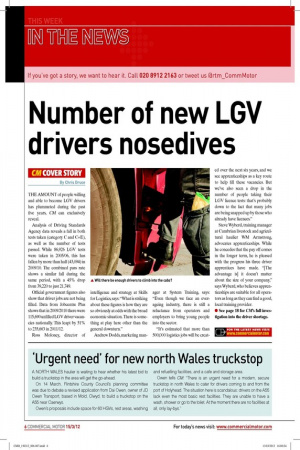Number of new LGV drivers nosedives
Page 4

If you've noticed an error in this article please click here to report it so we can fix it.
By Chris Druce THE AMOUNT of people willing and able to become LGV drivers has plummeted during the past ive years, CM can exclusively reveal.
Analysis of Driving Standards Agency data reveals a fall in both tests taken (category C and C+E), as well as the number of tests passed. While 86,926 LGV tests were taken in 2005/06, this has fallen by more than half (43,094) in 2009/10. The combined pass rate shows a similar fall during the same period, with a 45% drop from 39,220 to just 21,749.
Oficial government igures also show that driver jobs are not being illed. Data from Jobcentre Plus shows that in 2009/2010 there were 115,690 unilled LGV driver vacancies nationally. This leapt by 51% to 235,663 in 2011/12.
Ross Moloney, director of intelligence and strategy at Skills for Logistics, says: “What is striking about these igures is how they are so obviously at odds with the broad economic situation. There is something at play here other than the general downturn.” Andrew Dodds, marketing man ager at System Training, says: “Even though we face an everageing industry, there is still a reluctance from operators and employers to bring young people into the sector.
“It’s estimated that more than 500,000 logistics jobs will be creat ed over the next six years, and we see apprenticeships as a key route to help ill these vacancies. But we’ve also seen a drop in the number of people taking their LGV licence tests: that’s probably down to the fact that many jobs are being snapped up by those who already have licences.” Steve Wyberd, training manager at Cumbrian livestock and agricultural haulier WM Armstrong, advocates apprenticeships. While he concedes that the pay off comes in the longer term, he is pleased with the progress his three driver apprentices have made. “[The advantage is] it doesn’t matter about the size of your company,” says Wyberd, who believes apprenticeships are suitable for all operators as long as they can ind a good, local training provider.
l See page 18 for CM’s full investigation into the driver shortage.




































